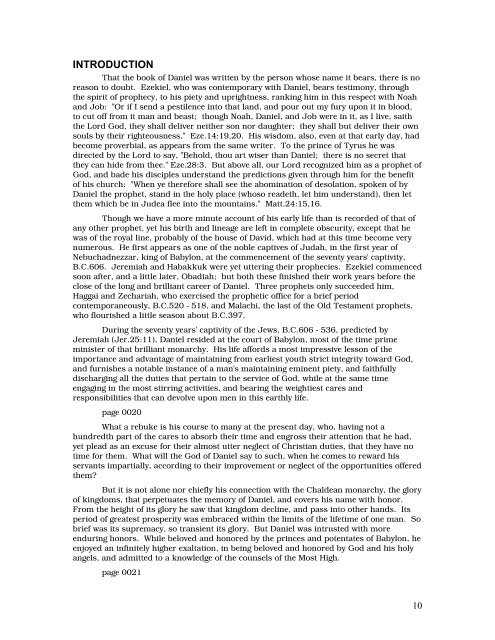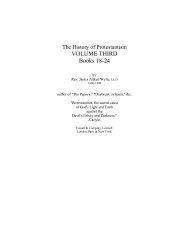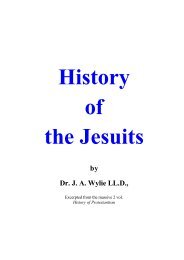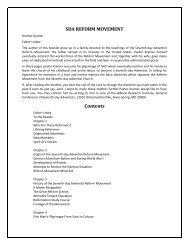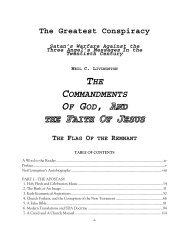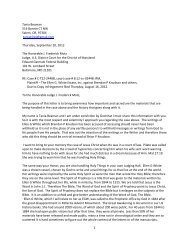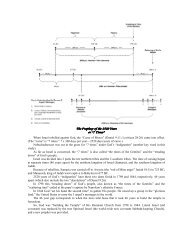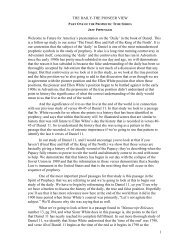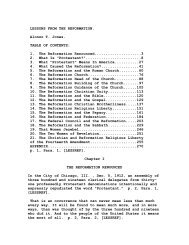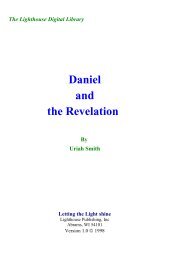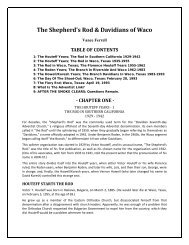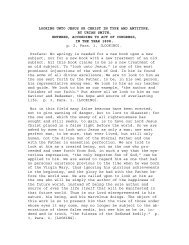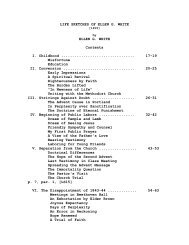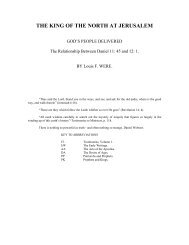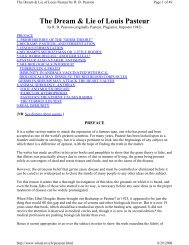Daniel and the Revelation. Uriah Smith
Daniel and the Revelation. Uriah Smith
Daniel and the Revelation. Uriah Smith
Create successful ePaper yourself
Turn your PDF publications into a flip-book with our unique Google optimized e-Paper software.
INTRODUCTION<br />
That <strong>the</strong> book of <strong>Daniel</strong> was written by <strong>the</strong> person whose name it bears, <strong>the</strong>re is no<br />
reason to doubt. Ezekiel, who was contemporary with <strong>Daniel</strong>, bears testimony, through<br />
<strong>the</strong> spirit of prophecy, to his piety <strong>and</strong> uprightness, ranking him in this respect with Noah<br />
<strong>and</strong> Job: "Or if I send a pestilence into that l<strong>and</strong>, <strong>and</strong> pour out my fury upon it in blood,<br />
to cut off from it man <strong>and</strong> beast; though Noah, <strong>Daniel</strong>, <strong>and</strong> Job were in it, as I live, saith<br />
<strong>the</strong> Lord God, <strong>the</strong>y shall deliver nei<strong>the</strong>r son nor daughter; <strong>the</strong>y shall but deliver <strong>the</strong>ir own<br />
souls by <strong>the</strong>ir righteousness." Eze.14:19,20. His wisdom, also, even at that early day, had<br />
become proverbial, as appears from <strong>the</strong> same writer. To <strong>the</strong> prince of Tyrus he was<br />
directed by <strong>the</strong> Lord to say, "Behold, thou art wiser than <strong>Daniel</strong>; <strong>the</strong>re is no secret that<br />
<strong>the</strong>y can hide from <strong>the</strong>e." Eze.28:3. But above all, our Lord recognized him as a prophet of<br />
God, <strong>and</strong> bade his disciples underst<strong>and</strong> <strong>the</strong> predictions given through him for <strong>the</strong> benefit<br />
of his church: "When ye <strong>the</strong>refore shall see <strong>the</strong> abomination of desolation, spoken of by<br />
<strong>Daniel</strong> <strong>the</strong> prophet, st<strong>and</strong> in <strong>the</strong> holy place (whoso readeth, let him underst<strong>and</strong>), <strong>the</strong>n let<br />
<strong>the</strong>m which be in Judea flee into <strong>the</strong> mountains." Matt.24:15,16.<br />
Though we have a more minute account of his early life than is recorded of that of<br />
any o<strong>the</strong>r prophet, yet his birth <strong>and</strong> lineage are left in complete obscurity, except that he<br />
was of <strong>the</strong> royal line, probably of <strong>the</strong> house of David, which had at this time become very<br />
numerous. He first appears as one of <strong>the</strong> noble captives of Judah, in <strong>the</strong> first year of<br />
Nebuchadnezzar, king of Babylon, at <strong>the</strong> commencement of <strong>the</strong> seventy years' captivity,<br />
B.C.606. Jeremiah <strong>and</strong> Habakkuk were yet uttering <strong>the</strong>ir prophecies. Ezekiel commenced<br />
soon after, <strong>and</strong> a little later, Obadiah; but both <strong>the</strong>se finished <strong>the</strong>ir work years before <strong>the</strong><br />
close of <strong>the</strong> long <strong>and</strong> brilliant career of <strong>Daniel</strong>. Three prophets only succeeded him,<br />
Haggai <strong>and</strong> Zechariah, who exercised <strong>the</strong> prophetic office for a brief period<br />
contemporaneously, B.C.520 - 518, <strong>and</strong> Malachi, <strong>the</strong> last of <strong>the</strong> Old Testament prophets,<br />
who flourished a little season about B.C.397.<br />
During <strong>the</strong> seventy years' captivity of <strong>the</strong> Jews, B.C.606 - 536, predicted by<br />
Jeremiah (Jer.25:11), <strong>Daniel</strong> resided at <strong>the</strong> court of Babylon, most of <strong>the</strong> time prime<br />
minister of that brilliant monarchy. His life affords a most impressive lesson of <strong>the</strong><br />
importance <strong>and</strong> advantage of maintaining from earliest youth strict integrity toward God,<br />
<strong>and</strong> furnishes a notable instance of a man's maintaining eminent piety, <strong>and</strong> faithfully<br />
discharging all <strong>the</strong> duties that pertain to <strong>the</strong> service of God, while at <strong>the</strong> same time<br />
engaging in <strong>the</strong> most stirring activities, <strong>and</strong> bearing <strong>the</strong> weightiest cares <strong>and</strong><br />
responsibilities that can devolve upon men in this earthly life.<br />
page 0020<br />
What a rebuke is his course to many at <strong>the</strong> present day, who, having not a<br />
hundredth part of <strong>the</strong> cares to absorb <strong>the</strong>ir time <strong>and</strong> engross <strong>the</strong>ir attention that he had,<br />
yet plead as an excuse for <strong>the</strong>ir almost utter neglect of Christian duties, that <strong>the</strong>y have no<br />
time for <strong>the</strong>m. What will <strong>the</strong> God of <strong>Daniel</strong> say to such, when he comes to reward his<br />
servants impartially, according to <strong>the</strong>ir improvement or neglect of <strong>the</strong> opportunities offered<br />
<strong>the</strong>m?<br />
But it is not alone nor chiefly his connection with <strong>the</strong> Chaldean monarchy, <strong>the</strong> glory<br />
of kingdoms, that perpetuates <strong>the</strong> memory of <strong>Daniel</strong>, <strong>and</strong> covers his name with honor.<br />
From <strong>the</strong> height of its glory he saw that kingdom decline, <strong>and</strong> pass into o<strong>the</strong>r h<strong>and</strong>s. Its<br />
period of greatest prosperity was embraced within <strong>the</strong> limits of <strong>the</strong> lifetime of one man. So<br />
brief was its supremacy, so transient its glory. But <strong>Daniel</strong> was intrusted with more<br />
enduring honors. While beloved <strong>and</strong> honored by <strong>the</strong> princes <strong>and</strong> potentates of Babylon, he<br />
enjoyed an infinitely higher exaltation, in being beloved <strong>and</strong> honored by God <strong>and</strong> his holy<br />
angels, <strong>and</strong> admitted to a knowledge of <strong>the</strong> counsels of <strong>the</strong> Most High.<br />
page 0021<br />
10


